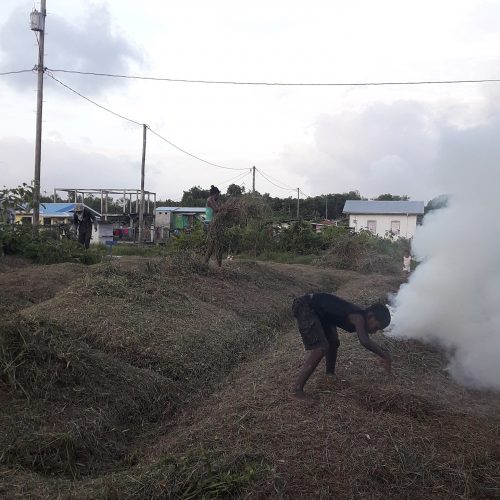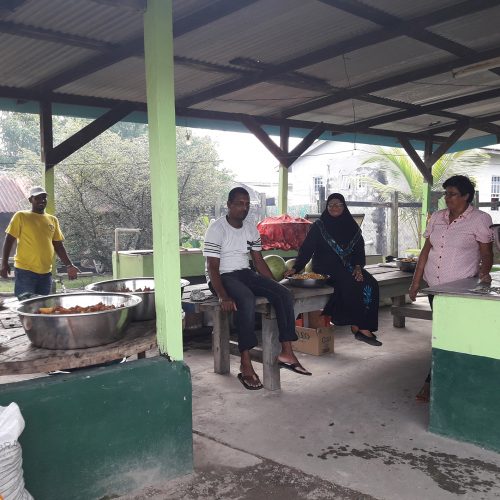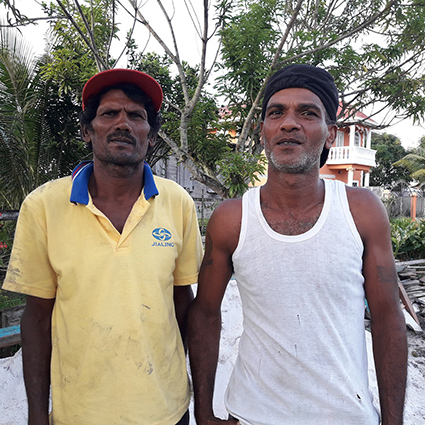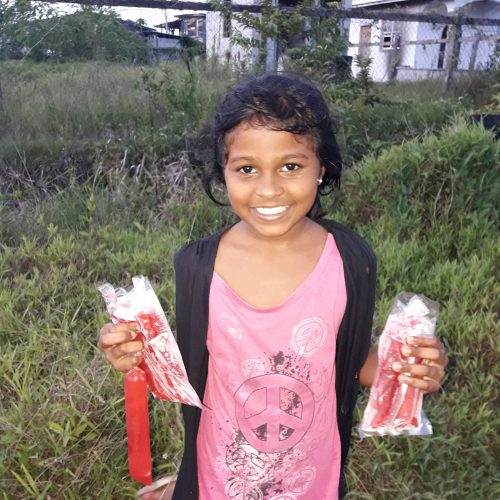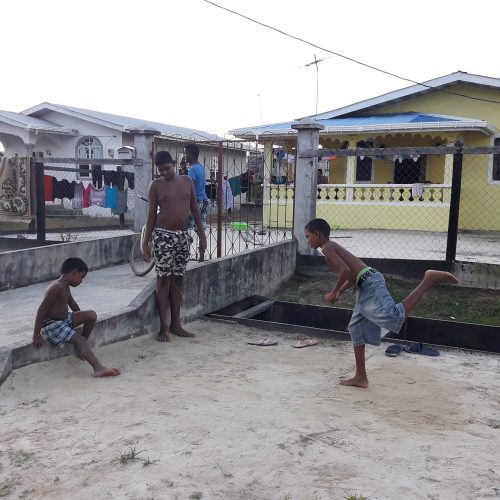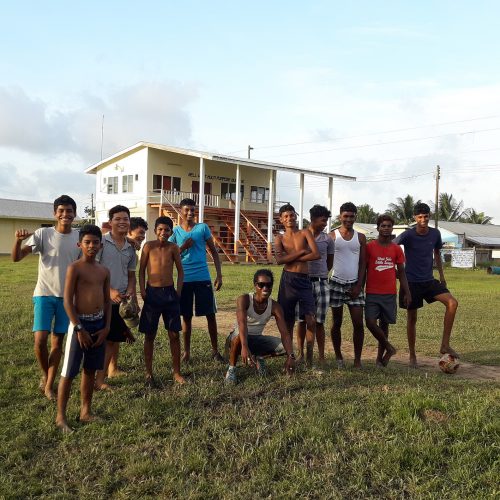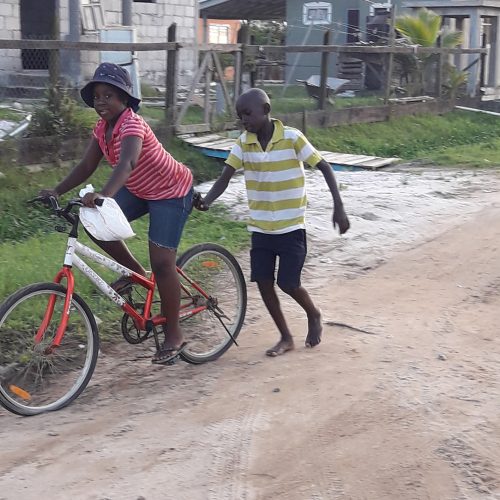Belle West Housing Scheme sits in the heart of Canal Number Two, bordered by the village of Clay Brick (west), sugarcane fields (east and south) and the main canal to the north. The scheme, which is divided into two phases, provides a haven for almost 5,000 people who call it home.
As the name suggests, Belle West is considered the beauty of West Demerara and was once known as Plantation Belle, decades ago when it belonged to the then-thriving Wales Sugar Estate. The community is multiethnic with people from various parts of Guyana having settled in it over the years, since the opening of the village in 2001.
Minibuses serve the community from the Belle West bus park in Georgetown at a cost of $200 per trip, usually up until around 8 pm. After that time, residents and visitors would have to get a bus running the Wales route and get off at the Stanleytown/Canal Number Two junction where they would find cars available to take them into Belle West. The fare from the junction to Phase One of Belle West usually costs of $100, but the minute the clock strikes seven at night, the fare automatically doubles. Persons living in Phase Two lucky to have a driver willing enough to take them pay $200 or $300 after 7 pm. The trip from the junction into Belle West lasts five minutes.
Fifty-four-year-old Ruth Samuels was born and raised in Industry, East Coast Demerara. She settled in Belle West in 2003.
“At the time Sheik Baksh was the minister [of housing] and he said was either two places available, either Belle West or Diamond and Diamond was very swampy, so I choose Belle West. [When] I came here to live [my house] was the only house through my street. It had three other houses around in other streets,” Samuels said.
At the beginning there were various challenges. Though the village had a main road then, it was all loam and was actually the longer way into the village. The road led from the access bridge for Clay Brick, and persons then preferred to take the shorter route, using the Clay Brick road then crossing wooden planks into the village. Samuels was even more challenged having had an injury that left her foot permanently damaged, resulting in a limp. It took her longer to get home than the average resident.
“I like living here,” Samuels said. “It’s a quiet and peaceful place. The only thing is that I live nearby the Belle West Multipurpose Building and whenever they got session [concerts] I can’t deal with it. They would play music till day clean. I have heart disease and can’t take it. To avoid the noise, I would have to go away for the weekend. The building shouldn’t be allowed to have those sessions especially since it’s a residential area.”
But she also noted the convenience of the village which has numerous shops, a mandir, a mosque, a number of churches, a nursery and primary school, a health centre and a ball field.
However, because of a number of petty crimes in the area, as well as the recent murder of a pensioner, Samuels is hoping that Belle West will soon have its own police outpost which will also benefit other villages in Canal Number Two Polder as well as Stanleytown.
“There are lots of domestic violence cases in the area. You would call the police and they would have you waiting a long time before they show up or they tell you the police not in that they gone on a patrol. Sometimes they even tell you that if you take a taxi they’ll go with you then just one or two of them show up,” she lamented.
Samuels works as a caregiver at Boodhoo’s Playgroup and Daycare Centre and rears meat birds for sale as well. She would also like to see road repairs done in the village.
Imam of the Belle West Masjid, Naushad Ally Boodhoo, moved to the village in August, 2008. Boodhoo, who hails from Plantation Rosetta situated further in Canal Number Two Polder, recalled passing Plantation Belle years before and seeing men toiling in the cane fields.
“Occupancy was very slow at first due to no electricity or water. Eventually with the push and pull factor of migration, people began to move in. When I moved here with my family, water was here already, but the water we got came trickling; the pressure was very low. Electricity was put in after,” Boodhoo said.
He shared that the water/electricity challenges, more so the idea of change made him reluctant to move, but once he did, he and his family quickly adapted.
The concerned resident added that three major issues are alcohol abuse, petty crimes and domestic violence. He further explained that most of the men who get caught up in this are cane harvesters and it is his opinion that a life of hard work and poverty as well as no formal education, contribute to this issue. Alcoholism, he said, is one of the leading causes of domestic abuse in the community.
Boodhoo, one of the most prominent persons of the Belle West, served on the PTA committees as president for the Belle West Nursery and Primary schools as well as all the other schools in Canal Number Two. He is currently a member of the Community Development Council. “We try to craft programmes for the youths. We recently had a programme in collaboration with the Ministry of Cohesion. They tried to tackle racial issues within the community, suicide, sex education and other teenage issues,” he said.
He also noted the need for the village to have its own police outpost and more patrols in the area. In addition, he hopes to see streetlights; a market square, which is currently in progress through the Neighbourhood Democratic Council, though slow; people being more environmentally friendly; an area designated for a cemetery and more improved roads especially in Phase Two. Boodhoo also called for Belle West to have its own access bridge, the Clay Brick access bridge is still being used. He said the previous administration had promised the community its own bridge, but nothing ever came of it.
The music sessions at the ground affect him as well and to this he said that minimum permission should be given to individuals holding barbecues. These events, he opined, encourage youths to drink and gamble.
Furthermore, the man added that there is a lack of job opportunities in the village. Many of the persons laid off from the sugar estate closure diverted to construction, domestic work, catching fish, small businesses and other forms of labour.
“Our masjid has been established for 11 years now and we have the presence of a strong Muslim community. Belle West has a lot of religious-minded people owing to the mandir and masjid and all the churches, yet there still remains an issue of mobilizing people to better enhance their spiritual life,” he concluded.
Mohan Ramdohan was one of the first persons to settle in Belle West; he moved from Alliance in the Canal Polder.
Of the 17 years he has lived in Belle West, 14 were spent at the sugar estate. Its closure was a big blow, he said. To get by, he tries his hand at construction sometimes and would do odd jobs around the area. Sometimes he weeds and plants at the few remaining private farms, but said he works all day for a meagre $2,500. When he feels like it, or when it is his only option, he picks up his hook, rod and line and heads for conservancy at the end of the Canal Polder to get himself some “sweet water” fish.
A man, he said, can no longer be the sole breadwinner of the home with such small wages; it takes two to make it.
“It’s nice to live here, but people thiefing in the place. You buy lil material to mek yuh house and night time deh thief it out and when you call the police, they not coming. The thiefing ease up now cause couple of them in jail but soon deh come out back, the thiefing start again,” Ramdohan said.
Apart from wanting the police to patrol more often in the village, he also wishes for the streets to be fixed saying that under the previous government when the roads were being fixed, not all were fixed; there were streets that were never redone and left with huge potholes including his street.
Phase Two of the community began with gigantic potholes that took vehicles forever to get through and almost three blocks of land or more on both sides of the road bloomed not in a scheme thriving but of a tiny jungle of trees. This would be a scary place to walk by at night as during the day it felt isolated and dreary. Phase Two was opened some five years ago.
The very first houses are two-thirds of the way into the village. Because the road is not busy, people loiter about the village. The streets are all loam and in even worse condition than any other roads in Belle West.
“The road is very bad, and the drivers don’t want to come in. You got to pay extra if they do. Sometimes we got to hire taxis and sometimes they charge $1,000,” Dennis Garnett said.
He moved from Patentia five years ago. He and his family survived numerous floods and it took seven truckloads of sand to raise his yard and prevent the floods.
Garnett was also one to lose his permanent job when the Wales Estate went under. He had worked with the Guyana Sugar Corporation for 24 years. Now he works part-time with his church. “It isn’t easy with the closing of the estate. I can’t earn on a regular basis. I have to always worry about where money is coming from,” he said.
Phase Two is much quieter and simpler than of Phase One and that is what Garnett likes about it, but that is as far as the liking goes. The many vacant and swampy house lots serve as breeding grounds for mosquitos which makes them unavoidable.
Streetlights are needed, Garnett noted, explaining that because there are not many houses in the area and with the front part of the phase being completely uninhabited, it gets pretty dark; having a torchlight is a necessity.
“Most of the house lots belong to people who have two or three houses already and they take their time in building because they aren’t in need of a place to live so the government should be more thorough and see that persons given house lots are those in need of it. One of the questions on the housing form is if given a house lot, how long it will take to build. They expect you to start building in six months’ time and it’s been years now and people have not start building,” Garnett said.

